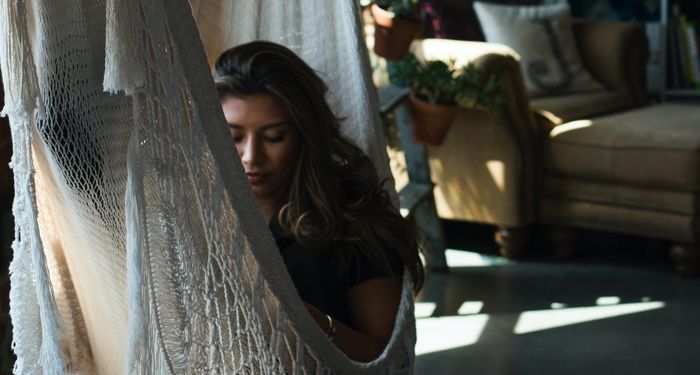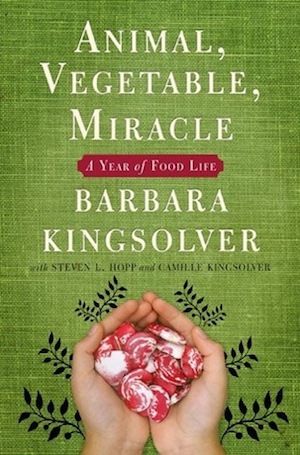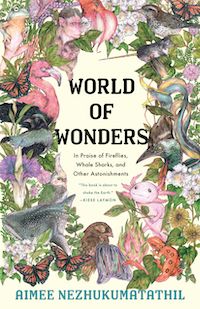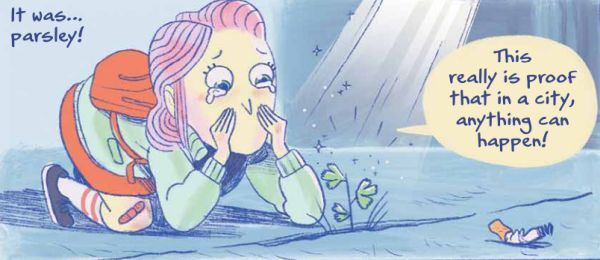I’ve always been an indoorsy person. Holed up in my bedroom with a pile of books instead of wandering around the neighborhood with friends. Scared that the outdoors — all bugs and blaring sun and ocean waves — would swallow me up.
As an adult, I am a full-on Scrooge. My husband takes our 6-year-old on hours-long walks along our local trails while I marathon back episodes of The Mindy Project. He takes her to the town pool while I loll about in our air conditioning, reading or making ukulele videos. He teaches her how to garden while I play Spider Solitaire. Barbecues? I hate ’em. Why would I want to sit around, stewing in my own underboob sweat, dodging wasps, and being devoured by mosquitos? Bah, humbug!
In order to illustrate my unease with the outdoors, I sometimes tell the story of the time a bee alit on my steering wheel as I was exiting the mall parking lot. I screeched my way back into the lot, pulled diagonally across four parking spots, yanked up the emergency brake, and fled the car. Another shopper watched from a distance as I ran laps around the vehicle.
More recently, I killed a succulent.
Still…there is something to those books that force me to appreciate nature, even if from a vast distance.
Falling for Nature (on the Page)
The first time I found myself loving (fictional) nature was in my late teens/early 20s when, improbably, I fell in love with the work of Barbara Kingsolver. (I say improbably because Kingsolver does not seem the least bit indoorsy.) I read all of her books, but I was particularly taken with Prodigal Summer, which seesawed back and forth between a wildlife biologist living in the Appalachian woods, a city girl settling into farm life, and two older farmers with wildly different approaches to the way they worked the land. Something about these varying perspectives — deeply respectful, prideful, cautiously hopeful — allowed me to look at the world outside my window with a deeper appreciation for the ways in which we coexist.
When she came out with Animal, Vegetable, Miracle seven years later, in a move that dovetailed nicely with the rising popularity of the locavore movement, I was hooked. I dog-eared pages with resources on farmers’ markets and seed packets and I underlined passages about seasonal planting and cheesemaking. Sure, I never actually planted anything (all flora seem to die in my care), but the idea of it was intoxicating.
Maybe it was my eventual acknowledgment and unapologetic embrace of my indoorsiness that kept me away from nature writing in subsequent years. I think I went through the entirety of my 30s without reading anything that brought me any closer to nature.
But then the pandemic happened.
Pandemic Reading
There’s nothing that makes you want to go outside quite like being trapped inside. And in the early days of the pandemic, as the weather warmed, we did that a lot. As a family, we walked the trails up the street, bringing along buckets in which my daughter collected branches and stones and tiny flowers. We did loops around the neighborhood, watching the cherry blossom and dogwood trees start to bud and blossom, branches arcing over the sidewalk in a colorful spray. We cobbled together fairy houses in our backyard garden and we sprawled along our driveway with chalk and we looked for painted rocks hidden in flowerbeds and beneath trees, dotted in different colors and emblazoned with motivating turns of phrase like “have hope” and “stay strong.”
In December 2020, I read Robin Wall Kimmerer’s Braiding Sweetgrass with the Feminist Book Club. I wasn’t excited about it. After all, what did I stand to gain from a book about “the teachings of plants”? But I was drawn in by Kimmerer’s lyricism, and for her reverence for the natural world. Her writings about living with reciprocity toward the land made me want to live differently. To be a better person.
Soon after, I read The Seed Keeper by Diane Wilson, and World of Wonders by Aimee Nezhukumatathil. The former again drove home the importance of veneration for land and for the things we grow, told through the story of a Dakhóta woman who is taken from her ancestral land at a young age, only to return later in life. The latter pairs short, lyric essays with charming illustrations, each essay about a different natural wonder. The cover alone is a gorgeous testament to the flora and fauna by which we’re surrounded, as absorbing as one of those magic eye pictures I used to see at the mall. I remember standing before them for minutes on end until the true picture underlying the picture emerged. The cover of World of Wonders is like that, except I find myself falling into its collage of intertwining flowers and creatures, a narwhal peeking out from behind catalpa leaves, a jellyfish flashing rainbow neon alongside a potoo with wide, yellow eyes.
Most recently, I read Guerilla Green by Ophelie Damblé and Cookie Kalkair and Seen: Rachel Carson by Birdie Willis and Rii Abrego. The first is a charming as hell work of graphic nonfiction about a young woman who’s super into the guerilla gardening movement. I loved its sense of humor, its earnestness, and its practical tips on making things grow in the most unlikely of places. The second is a graphic biography about the renowned marine biologist and conservationist Rachel Carson. It’s a glimpse into how much one woman can achieve in the face of global environmental destruction. Both make you interrogate the effects our small actions can have on the world around us, both positive and negative.
Connecting to Nature in My Own Way
These days, I flip through my copy of Carleen Madigan’s The Backyard Homestead, marking pages on various gardening techniques, even though I know that I myself won’t be digging my hands into the soil outside or tending to the plants in our herb window.
Still, I dream of basil bowls and small pots of garlic and scallions. I dream of hyacinths and hydrangeas. Baking zucchini chocolate chip cookies with yield from our garden. Making eggplant parmesan empanadas. My husband and I look at different bird feeders online. He starts small pots of seeds and places them in our herb window, to be planted in the garden as the weather warms.
Late last year, my daughter threw the seeds from one of her apples into a pot of soil, wiggling with excitement, her eyes full of dreams.
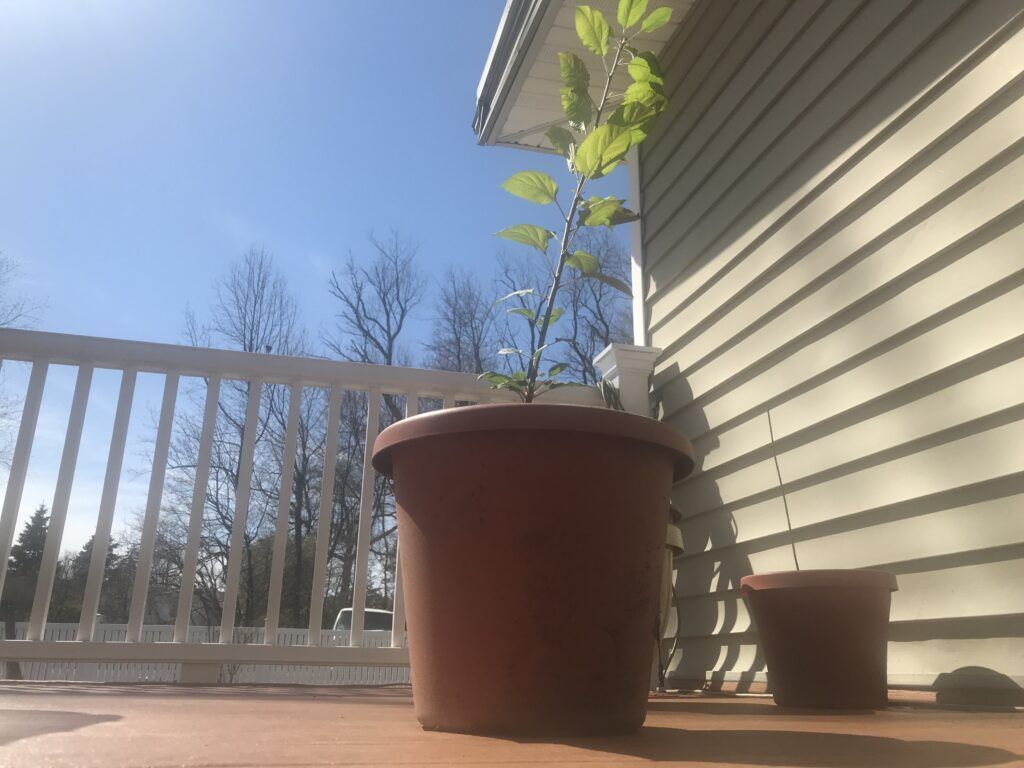
My husband and I didn’t hope for much. But it looks like, in another eight years, this tree of hers will bear fruit.
If that random assortment of apple seeds can bear fruit, I can better appreciate the world outside my window. Even if just through the pages of the books I read.
It’s amazing what can come from small beginnings.

